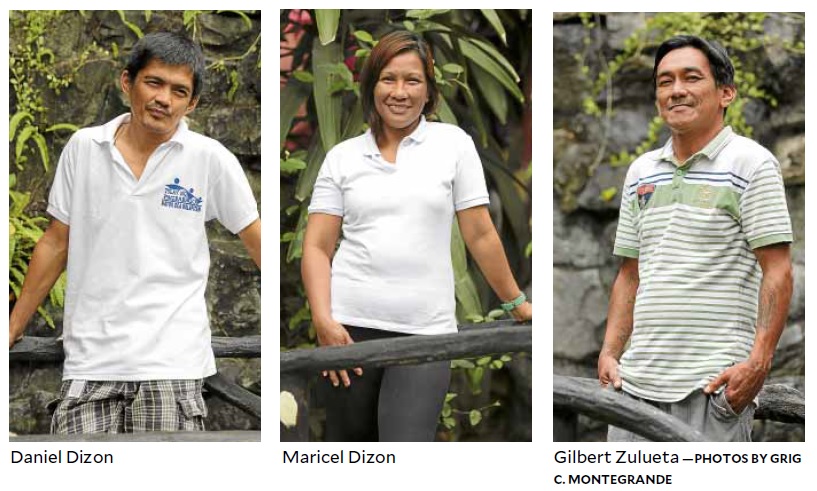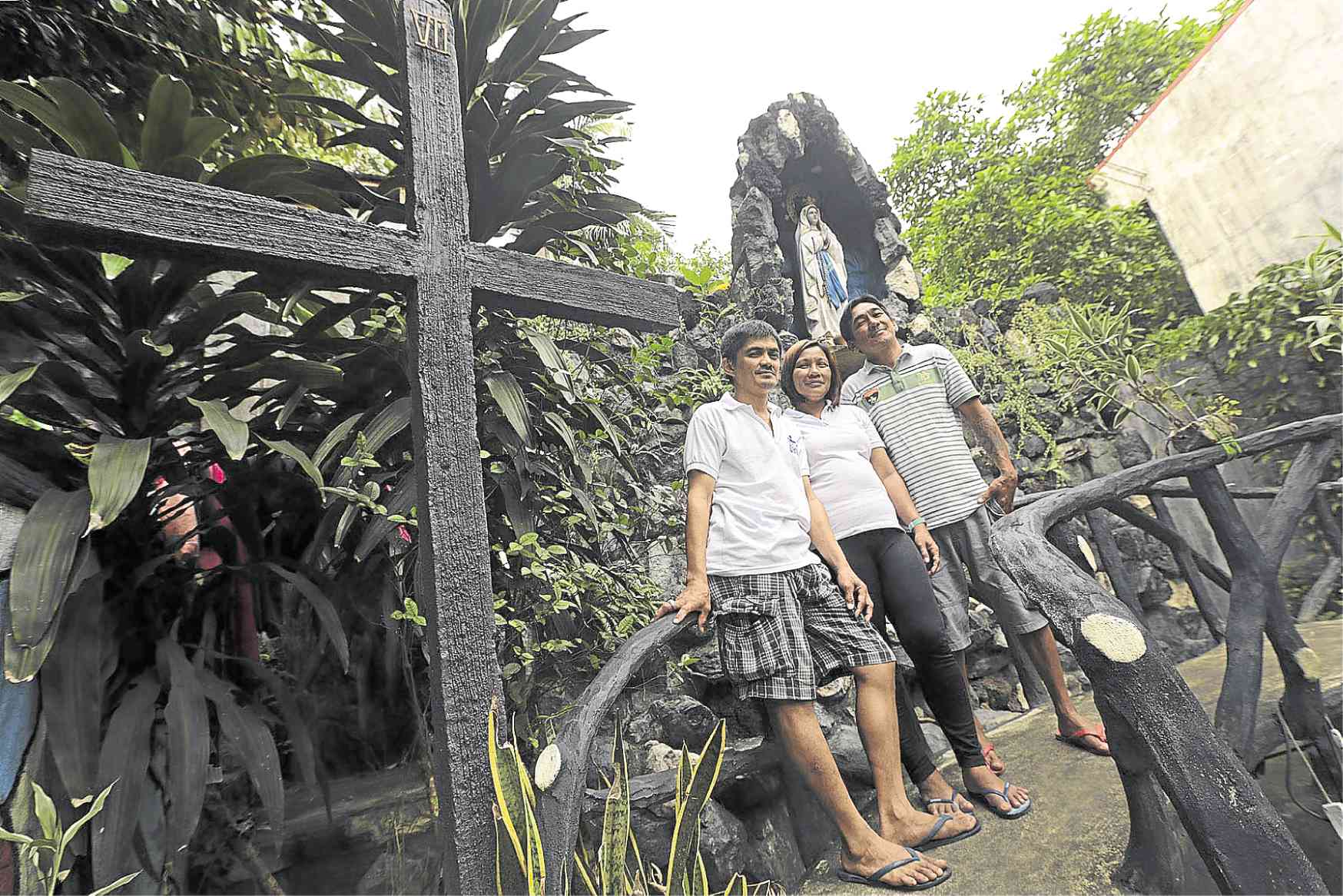Caloocan drug rehab program gives former users new hope
For most people, Christmas is a time for both frivolity and reflection, a season that gains more significance when spent with family and friends.
But for former drug dependents Gilbert Zulueta, Daniel Dizon and wife, Maricel, who hail from drug-affected communities in Caloocan City, it means so much more: A long-awaited second life and a clean break with the past.
After spending six months in rehabilitation, the three have emerged clean and sober, ready to dedicate their lives to Christ and the church: Zulueta and Maricel as laypeople and Daniel as a church worker at Our Lady of Lourdes Parish in Camarin.
For the first time in years, they will celebrate Christmas no longer as “sinners” but as living examples that there can be salvation from drug use.
“I can think of nowhere better to be than with the church,” Daniel told the Inquirer in a recent interview. “We feel at home here, where the call of vice cannot overcome the call of God.”
Article continues after this advertisementChance for redemption
Article continues after this advertisementThe three are “graduates” of the Caloocan City government’s comprehensive community-based rehabilitation program for drug surrenderees, also known by the whimsical name of Carrots (Community-Assisted Rehabilitation and Recovery Outpatient Training System).
Since 2016, the program has turned out 50 former drug dependents, most of whom have successfully reintegrated themselves into society, said Sikini Labastilla, head of the city’s antidrug abuse council.
Done in partnership with the church and other private volunteers, the program was a direct response to the rampant killing of drug suspects in the city under President Duterte’s bloody war on drugs.
“What the program does is address drug abuse at its root cause,” Labastilla said. “There is a big difference between simply looking at them as criminals and as victims of an illness.”
At that time, Our Lady of Lourdes Parish under the leadership of Argentine priest Luciano Felloni was already conducting its own rehab program for drug dependents.
Father Marvin Riquez, one of the parish priests, said that every night, no lower than two bodies of drug suspects would turn up in the city. “Eventually, we felt we needed to step in [through the Carrots program] and take drug users under our wing to save them from the nightly carnage, giving them a chance to redeem themselves.”
It is that shared narrative that binds Zulueta, the Dizons and other drug surrenderees together: the fall from grace and the hope for absolution.
Same story
“All of us have almost the same story: We got into drugs because we were in pain in some way,” said Daniel, 48. “But we found ourselves here because we realized there was no other recourse from such a life except through the Lord.”
He and his wife Maricel, 40, signed up for the program in November 2016. At the time, both had been regularly using “shabu” (crystal meth) for years and it was starting to tax their relationship with each other and with their two sons aged 16 and 15.
The couple said they had no idea that the other was into drugs. But by Maricel’s own
account, she was worse off than her husband who said he took shabu only to get through the long working hours at a catering service.
Temporary reprieve
Maricel said she turned to drugs and alcohol to shore up her heart amid her father’s failing health. The deadly cocktail provided a momentary reprieve but it got to the point where she would disappear from their home for extended periods of time just to use drugs. She also started getting into physical fights with Daniel.
When the bodies of drug suspects, some of them their friends, began to surface after President Duterte declared a crackdown on drugs, the Dizons admitted feeling terrified.
However, the first genuine stirrings to turn over a new leaf came not from fear but love when their eldest son, having discovered their secret, began attending parish-based family forums in their stead.
Throughout the six-month rehab program, he never left their side. An honor student, the boy even became the designated tutor for the children of fellow recoverees in the parish.

Where love saved the Dizons, it was the need to regain it that propelled Zulueta, 41, to seek help.
A shabu user since his teens, Zulueta surrendered to authorities at the height of the Philippine National Police’s “Oplan Tokhang” upon his wife’s urging.
“At first I didn’t understand why I needed to surrender. I kept telling her, ‘Why should I? I wronged you, our children, not the police.’ It was only later that I realized the depth of the wounds I had left on my family because of my habit. It alienated them from me,” he said.
Eager to earn back his family’s trust, Zulueta entered the third batch of the Carrots program in April this year.
No easy path
The road to recovery was rough, he admitted. His wife left him during his first month in the program, while his eldest child refused to talk to him. “It was so painful but I had to keep going. If I gave up, I would be worse off, knowing I didn’t do my best to save my family.”
In his moments of weakness, Zulueta found solace in prayers and God’s word. “If the Lord can forgive a sinner like me, so can my family.”
Though the three entered the program at different times, their paths to healing were identical. The Dizons graduated in May while Zulueta completed the rehab program in October.
Six-month program
Recovering from substance abuse is no mean feat, they admitted. The program requires exceptional fortitude and tremendous willpower, not only to relive their painful past but to also move past it. For six months, they attended group counseling and therapy sessions. They were also encouraged to attend spiritual formation forums and render community service work to strengthen their faith.
All three have confessed to to an occasional slip-up during the six-month period courtesy of friends they couldn’t turn down. But the beauty of a community-based program, Labastilla said, is that surrenderees have regular interactions both with fellow recoverees and their families.
“Because this setup allows them to go home to their families, [they’re able] to make amends as they progress with their recovery. It’s ideal for conflict resolution. There is greater chance for healing,” he added.
Since their graduation, the three have stayed free of vices while submerging themselves in church work. Both Zulueta and Maricel assist in Mass services as lay minister and mother butler, respectively. Daniel, on the other hand, serves as an “all-around assistant” to the parish, be it a cleaner or a cook. Often, they take charge of the younger laypeople, some of whom are also enrolled in the Carrots program.
“It feels nice to be trusted with important work. It’s nice to be the one helping instead of being the helpless one,” Zulueta said.
Back to normal living
Outside of the parish, the three are back to leading normal lives. Zulueta, now reunited with his wife and children, is between jobs. Daniel still works for the catering service as Maricel looks after their kids.
But it’s the church work that takes up much of their time and they’re only too happy to volunteer almost every day even though they receive no monetary compensation.
“It’s the biggest blessing of our lives. We still feel unworthy, but we believe it’s all part of God’s plan,” Maricel said.
But recovery is a lifelong process, Zulueta pointed out. “Just because you graduated from rehab does not mean you have succeeded. You have to keep working to be better. Otherwise, you squander the second chance you’ve been given.”
Daniel said that thanks to that second chance, they get to celebrate Christmas with their loved ones, a sentiment shared by Maricel.
“I can finally face Christmas this year with a clear conscience. I can’t think of anything better than to be with my family, to look at them and say to myself, ‘Thank God. We did it,’” she said.
